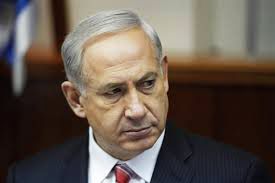It would be a "historic mistake" to ease pressure on Iran over its nuclear programme right now, according to Israeli PM Benjamin Netanyahu, BBC reported.
Opening parliament's winter session, Mr Netanyahu said Israel must "keep up the pressure" on Iran, "particularly at this moment".
His speech came on the eve of nuclear talks in Geneva between Iran and international negotiators.
Iran's foreign minister said he hoped a "roadmap" could be reached.
"Tomorrow is the start of a difficult and relatively time-consuming way forward," Mohammad Javad Zarif posted on his Facebook page.
"I am hopeful that by Wednesday we can reach agreement on a roadmap to find a path towards resolution."
Deputy Foreign Minister Abbas Araqchi will represent Iran at the talks, holding discussions with representatives of the P5+1 group, made up of Britain, China, France, Russia and the US plus Germany.
These are the first such talks since Iranian President Hassan Rouhani took office in August.
Mr Rouhani is seen as more moderate than his predecessor Mahmoud Ahmadinejad, which has raised hopes that a deal can be reached.
Mr Netanyahu told Israel's parliamentarians - among them some of Iran's fiercest critics - that any move to let up on the Iranian government would only strengthen its "uncompromising elements", and supreme leader Ayatollah Ali Khamenei "will be perceived as the winner".
In reference to the current international sanctions against Iran, he said it would be "a historical mistake to lift the sanctions, just before they are really effective".
Mr Netanyahu's comments were backed up by intelligence minister Yuval Steinitz, who called on the main powers in the Geneva talks to maintain pressure on Iran.
Mr Steinitz said it was the effect of sanctions, and the subsequent fact the "Iranian economy is in very bad shape", that was driving the Iranians to come to the talks.
"The dilemma will be crystal clear to them - that if they want to save their economy, they need to give up their nuclear project," he said.
But in the US - which has also shown a tough stance against lifting sanctions on Iran - nine leading senators said they were open to the idea of suspending new sanctions if Tehran took significant steps to slow its nuclear programme.
In a letter to President Barack Obama, the senators - both Democrats and Republicans - said the US should consider a plan of "suspension for suspension", in which Iran would suspend its nuclear enrichment programme and Washington would suspend new sanctions.
But the senators - who include the influential Republicans John McCain and Lindsey Graham - emphasised that, in the meantime, the threat of military force should remain, and pressure should be kept up against Iran.
Western nations believe Iran's uranium enrichment programme is covertly meant to achieve a nuclear arms capability.
Tehran denies this, saying it wants only to master nuclear technology to generate electricity and carry out medical research.
Iran has been negotiating with the P5+1 group since 2006, because it wants UN sanctions against it to be lifted.
Western negotiators have demanded that Iran halt the production and stockpiling of uranium enriched to 20% - a step away from achieving a nuclear weapons capability.
They also want Iran to send some of its stockpiles abroad, and shut down the Fordo production site near Qom where most of the higher-grade enrichment work is done.
But Mr Araqchi insisted on Sunday that there could be no question of Iran relinquishing its stockpiles of enriched uranium.
"We will not allow even a gram of uranium to go out of the country," he said, quoted on the website of Iranian state TV.
President Rouhani has said he wants to reach a deal on the nuclear dispute within three to six months.






